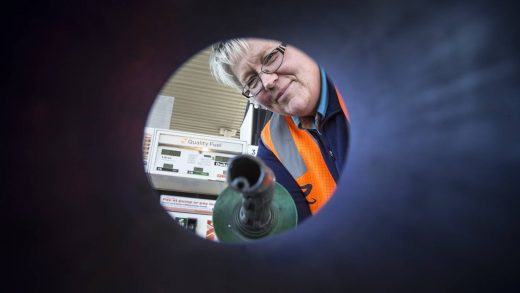
KELLY HODEL/STUFF/Waikato Times
Charity shops in the Nelson region have listed five things they wish people donated more – and three they don’t.
The Nelson region has a wealth of charity shops to choose from. Whether you’re a seasoned bargain hunter or simply cash-strapped, these businesses have everything a person could need.
However, while one man’s trash may be another man’s treasure, some charity shops are asking their donors not to take this literally.
Op-shops around the country have reported a rise in unwanted dumping during the pandemic – with most forced to take on the cost of disposing these unusable items themselves.
Stuff reporter Frances Chin asked charity shops and food banks around the region what items are needed – and which just simply aren’t.
READ MORE:
* Bride finds wedding items in op shop after package sent to wrong address
* There’s more to op shopping than bargains, it’s about community
* A day in the life of a charity shop
* The rise and rise of op shops, and how browsing the racks brings in revenue for charities
* Repairers and restorers: Meet the people who know how to make furniture last
Unsplash
Second hand towels are an item in high demand, says SPCA Op Shop and Retail Manager Louise Hoather.
Needed: Towels
Towels are an item the SPCA op shops never seem to have enough of, said South Island Op Shop and Retail Manager Louise Hoather.
Despite the common conception that most people would be unwilling to buy second hand towels, many people look to purchase towels from charity shops to use on their pets.
The SPCA is unable to accept donations of animal training aids as it goes against the organisation’s position.
Not needed: Animal training aids
The SPCA cannot accept donations of animal training aids like electronic training collars and choke chains, Hoather said. The charity advocates against animal owners using these devices, and so cannot sell these items or accept them as donations. SPCA op shops also do not accept donations of animal products they advocate against, such as fur.
123rf
Hospice Shop Nelson store manager Dianne Timbs says Men’s wear is always in high demand.
Needed: Men’s clothing
Items of men’s clothing always “fly off the shelves”, said Hospice Shop Nelson store manager Dianne Timbs. Men’s jackets, jerseys, shirts, and trousers are always in high demand in the charity store, as less of these items are donated. This may be due to the tendency of men to indulge less in fast fashion like women do – tending to hold onto items of clothing for much longer.
Unsplash
Dirty or unwearable clothing cannot be sold, and so should not be donated.
Not needed: Dirty clothes and broken items
Donated clothes must be clean and in good condition, Timb said. If they are dirty, ripped, missing buttons, or have a broken zip, they will not be able to be sold, and should not be donated.
Similarly, donated items must be “fit for purpose”. For example, tables missing legs or chipped crockery would not be able to be sold, and so shouldn’t be given to the charity shop.
“If it was something you couldn’t use in your home, don’t donate it.”
Robyn Edie/Stuff
Items of furniture such as chests of drawers are always in high demand with students and young people.
Needed: Items of furniture
With stores like The Warehouse and Kmart selling cheap, build-it-yourself furnishings, solidly crafted furniture was being seen less and less in charity shops, Timbs said. Despite this, furniture was always in high demand, especially with young people who were looking to furnish their flats and hostel bedrooms. Chests of drawers, especially, always sold fast. Small furniture such as coffee tables and bedside tables were always in need, Hoather said.
Madia Hamilton/Unsplash
Meat and dairy are food items the Foodbank has previously run short on, says Salvation Army community ministries team leader Richard Currie
Needed: Fresh meat and dairy
The two food items The Foodbank Project ran out of most were fresh meat and dairy, said Salvation Army community ministries team leader Richard Currie. Cheese, milk, and meat such as mince and sausages were the biggest shortfalls of the foodbank, which had provided 356 parcels so far this year to people in the Nelson Tasman area. However, due to the Foodbank’s new donation system that allowed people to purchase $20 food parcels, these shortfalls were less common.
Melissa Di Rocco/Unsplash
Oats and pasta sauce are occasionally difficult to donate, due to the preparation needed to eat them.
Not needed: Pasta sauce and oats (but they’ll still take them)
In the past, the Foodbank had developed a large backlog of bottles of pasta sauce and packets of oats, Currie said. While the foodbank would take any donation of prepackaged unopened food, these two items did not necessarily meet the needs of the homeless community due to the preparation needed before eating.
SIMON O’CONNOR/Stuff
Volunteers are needed at op-shops around the country.
Needed: Volunteers
Most of all, volunteers were needed to help run the op-shops, Hoather said. Due to the pandemic, people seemed to have less time to volunteer, causing op-shops to be “desperately short” on volunteer staff.
“We can ask for more donations, but if we haven’t got enough volunteers, we can’t check them in. It just makes it harder.”
CHRIS SKELTON/STUFF
John and Janice Milligan run Foodbank Canterbury, which collects safe, nutritious surplus food from all sectors of the food industry and redistributes it to charities. (First published 18 December 2020)


